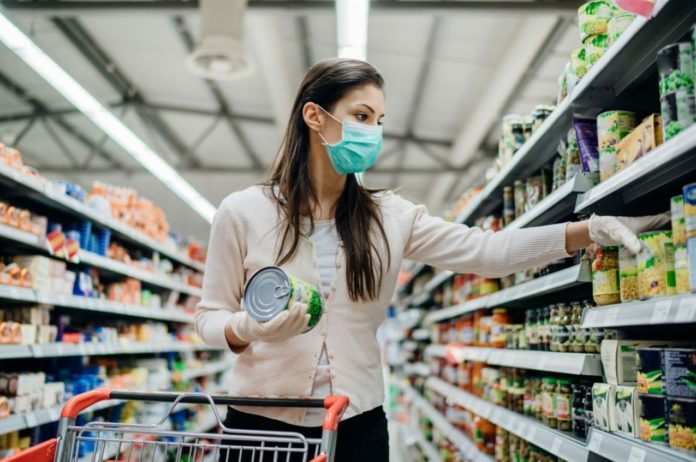A recent study suggests that anti-inflammatory diets can help prevent SARS-CoV-2 infection or reduce the severity of COVID-19.
The importance of a healthy diet for the effective functioning of the immune system has been thoroughly demonstrated in the literature. People who are malnourished, on the other hand, appear to have compromised immune systems, rendering them more vulnerable to viral infections.
According to a recent study, anti-inflammatory diets are likely to lower the disease’s immunopathological burden.
The current review paper discusses the role of anti-inflammatory dietary methods in preventing and controlling SARS-CoV-2 illness.
To do this, the researchers included all studies (excluding non-human studies) that investigated the effect of dietary micro/macronutrients on COVID-19-related hyperinflammation. Clinical studies, randomised controlled trials, meta-analyses, and review papers published between January 2020 and June 2021 were particularly chosen.
They finally selected and analyzed 17 research papers in the current review.
The analysis found that individuals infected with COVID with nutrient deficiency take longer to recover.
Furthermore, the majority of hospitalized patients were found to be deficient in at least one nutrient. The research largely focused on some essential anti-inflammatory dietary components, such as vitamins C and D, zinc, and omega-3 fatty acids, as well as the Mediterranean diet, as nutritional treatments for COVID-19 control.
Mediterranean diet
The Mediterranean diet, which includes fruits and vegetables, legumes, fish, and olive oil, has been shown to have anti-inflammatory, immunomodulatory, antioxidant, and anti-thrombotic properties. The Mediterranean diet has been shown to be particularly helpful in the management of cardiovascular, pulmonary, and metabolic illnesses.
In the case of COVID-19 management, studies indicated that the diet reduces the length of hospital stay and mortality rate in COVID-19 patients over the age of 65. Furthermore, the diet has been shown to minimize the risk of SARS-CoV-2 infection as well as COVID-19-related short- and long-term consequences.
Vitamin D
Vitamin D’s antiviral, anti-inflammatory, and immunity-boosting activities have been well-documented in the scientific literature. Vitamin D also lowers the synthesis of proinflammatory mediators by reducing T-helper 1 production.
Vitamin D administration has been demonstrated to shorten the length of stay in the intensive care unit (ICU) in COVID-19 patients who are critically unwell. Furthermore, studies have revealed that COVID-19 patients with vitamin D deficiency have a higher mortality rate, and that vitamin D treatment can improve COVID-19’s long-term immunological effects, such as persistent elevations of IL-6 and interferon-gamma levels.
Although more study is needed to determine whether vitamin D has a therapeutic advantage against COVID-19, most studies show that the therapeutic benefit is dependent on the patient’s past vitamin D status. As a result, enough vitamin D intake is often advised to avoid insufficiency. Vitamin D intake should be between 600 and 800 IU per day.
Vitamin C
Vitamin C’s antioxidant properties are well-known. It stimulates antibody synthesis by acting as a cofactor in numerous metabolic processes. Furthermore, it is known that consuming 1 gram of vitamin C per day reduces the production of proinflammatory cytokines (IL-6, TNF, and C-reactive protein) while increasing the production of anti-inflammatory cytokines (IL-10).
Intravenous infusion of high-dose vitamin C has been demonstrated to lower the length of ICU stay and fatality rate in COVID-19 patients. It also slows down the onset of COVID-19 symptoms. The impact of vitamin C supplementation in COVID-19 patients is now being investigated in the phase 2 interventional trial.
The recommended daily requirement for individuals is 90 mg of vitamin C. Although short-term vitamin C use is safe, high-dose vitamin C can cause health problems such as the creation of oxalate kidney stones.
Omega-3 polyunsaturated fatty acids
Proinflammatory cytokine production is inhibited by omega-3 fatty acids like eicosapentaenoic acid (EPA) and docosahexaenoic acid (DHA), which also create less inflammatory pro-resolving lipid mediators such prostaglandins, thromboxanes, protectins, and resolvins.
Omega-3 fatty acids may be useful in SARS-CoV-2 infection by controlling lipid raft fluidity and so preventing the development of the spike – angiotensin-converting enzyme 2 (ACE2) complex. A clinical investigation is currently underway to see how EPA diet affects SARS-CoV-2-infected patients.
Zinc
Zinc is an essential mineral for immune cells and T-helper and cytotoxic T cells to operate properly. Zinc supplementation has been proven to have an anti-inflammatory effect in COVID-19 patients. Furthermore, in SARS-CoV-2-infected patients, the mineral has been demonstrated to lower symptom intensity.
The authors concluded, “no single diet or food item has been proven to prevent COVID-19 infections. However, despite evidence that some supplements can affect outcomes in other respiratory tract infections, such as reduced inflammation marker levels, shortened ICU stay lengths, and incidence of infections, it is still unknown whether dietary supplements or nutraceuticals can therapeutically alter patient outcomes against COVID-19. Furthermore, there is little research linking them with the prevention of COVID-19. Until then, the public should focus on immunization through vaccination and prioritize appropriate nutritional status, and encouraging an active lifestyle.”
Image Credit: Getty
You were reading: A diet that reduces immunopathological burdens of COVID-19 Disease
